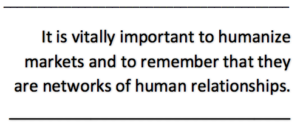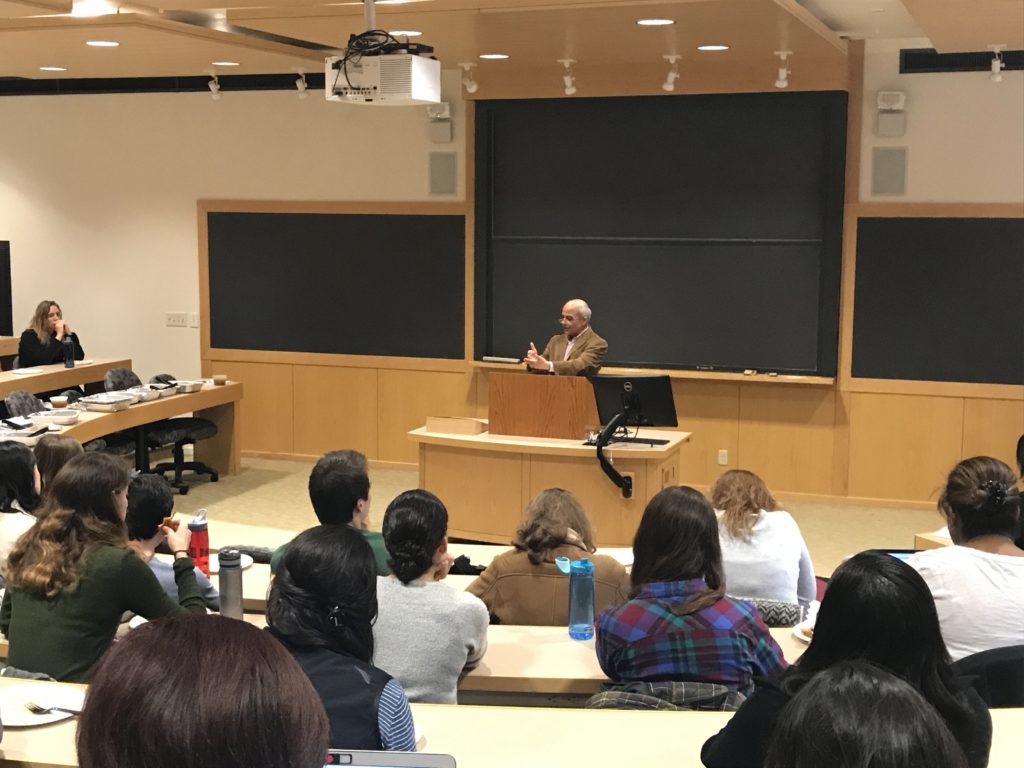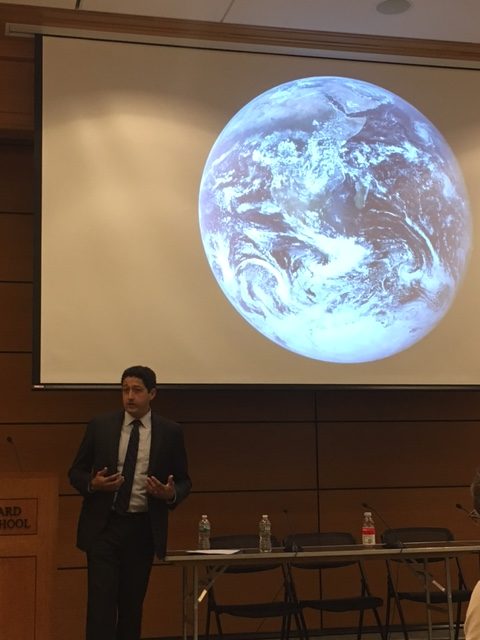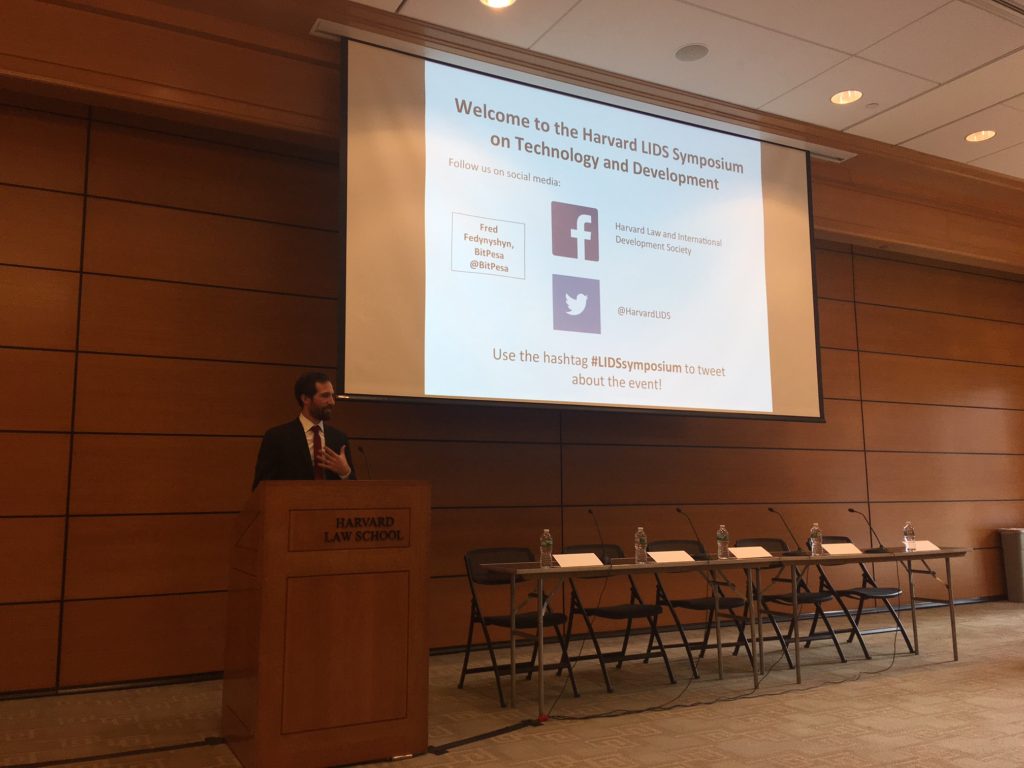By: Mike Maruca
Mark Weber, a fellow at the MIT Legatum Center for Development and Entrepreneurship and co-producer of the powerful documentary Poverty, Inc., opened the LIDS 2017 Symposium with a series of stories about the foundations of human flourishing. He encouraged the attendees to think algorithmically about development: to use an approach (1) based on principles derived from what is good for human ecosystems; and (2) that self-consciously identifies contradictions and hypocrisies in the international development system, in order to weed them out.
Mark opened with a story of Muhammed Al Bouazizi, the Tunisian fruit seller whose tragic death marked the start of the Arab Spring. Muhammed, who was operating extra-legally in the informal economy, had his fruit cart confiscated by a police officer and was banned from ever selling again. Muhammad had no legal remedy and his livelihood had been taken. His pure desperation led him to stand in the middle of the street and light himself on fire. It turns out many of those who self-immolated in the Arab Spring were micro-entrepreneurs; Muhammed’s brother explained a cause of the anger: “Even the poor should have the right to buy and sell.”
In Western media, the narrative of the Arab Spring tended to focus on corrupt dictators, not the right to access markets. But it was the lack of access to the basic institutions that caused Muhammed’s desperation; Muhammed was arbitrarily deprived of the freedom to create something of value in the world. And even if Muhammed had received microfinance or had the support of a trendy poverty-reduction-through-entrepreneurship organization, he would have always been one corrupt official away from catastrophe. Mark therefore encouraged the attendees to think on a systemic level about how to establish the conditions necessary for the Muhammeds of the world to provide for their families.
The second story described the protests of a woman nicknamed “Mommy” in Cambodia. In 2007, the constitutional monarch decided to lease land around a lack to a company controlled by a member of the Senate. Under the recent Cambodian land reform, such a lease was obviously illegal, but it did not matter. Mommy led protests for years and was beaten to within an inch of her life. The company was provided with licenses that showed they could destroy thousands of homes around the lake. Mark pointed out that folks on the political left would see such a situation and say “capitalism is to blame here,” while those on the right might argue “no, it’s totalitarianism that caused this injustice.” Mark said both can be correct; the real take-away is that, the more powerful an institution, governmental or otherwise, becomes, the more easily the rule of man can trump the rule of law. And we must always try not to lose sight of the people whose homes are bulldozed. It is vitally important to humanize markets and to remember that they are networks of human relationships.
The final story was about rice in Haiti and touched on three policies: agricultural subsidies, trade policy, and aid policy. Starting in the early 80s, the wealthy, agriculture-producing countries embarked on a policy of moving produce into poorer countries in an attempt to skip the agricultural economy and move straight into manufacturing. That did not work. Mark pointed to a few trends that led to the policy: the consolidation of big agriculture, small changes in US patent law, and growing subsidies that created incredible surpluses. To stave off a price collapse, the US needed to re-route some of its production into high fructose corn syrup, ethanol, trade, and in-kind donations to large non-profits that could turn around and sell subsidized food in developing markets (a method known as “monetization”).
That’s how rice swamped Haiti. But subsidized rice put about 100,000 Haitian rice farmers out of work, and while the absolute price of rice did indeed decrease, just as the donors intended, the relative price went up as the farmers’ purchasing power collapsed. The butterfly effects of US domestic policy rippled outward. Farmers were forced to abandon their lands and move into concrete buildings in crowded slums that collapsed in the Haitian earthquake. Mark pointed out that if we are interested in international development, we must also be interested in domestic policies, which function like steroids in competitive global trade regime, and which undermine our national reputation. Yet embedded interests can prevent needed reforms; starting in 2012 USAID pushed a procurement reform that would source 10% local goods for humanitarian emergencies. But the reform ran into big agriculture, big shipping, and big nonprofits in the US and therefore stalled. Mark argued that USAID falls under the State Department, whose mandate is to advance the interests of the United States, and he encouraged the participants to be on guard for the neo-colonialist undercurrent that often taints development work.
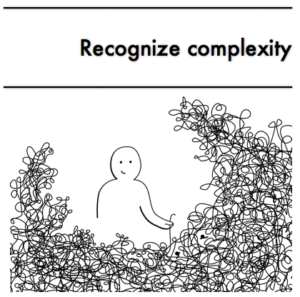 To close, Mark told the participants to try and recognize biases and paternalism; to question how our actions are perceived; to identify second, third, and fourth order effects of seemingly domestic policies; and perhaps most importantly, to recognize complexity. One can simultaneously recognize that many aid programs are masked stimulus packages for our own country and should end, yet still have real empathy for the global poor. One can believe in the good of markets, yet still see a role for humanitarian and emergency aid. Mark’s talk set the stage for the rest of the day’s discussion and was echoed across the following panels.
To close, Mark told the participants to try and recognize biases and paternalism; to question how our actions are perceived; to identify second, third, and fourth order effects of seemingly domestic policies; and perhaps most importantly, to recognize complexity. One can simultaneously recognize that many aid programs are masked stimulus packages for our own country and should end, yet still have real empathy for the global poor. One can believe in the good of markets, yet still see a role for humanitarian and emergency aid. Mark’s talk set the stage for the rest of the day’s discussion and was echoed across the following panels.
About the blogger: Mike Maruca is a 3L at Harvard Law and co-president of LIDS. He plans to work in renewable energy following his graduation in May 2018.
Follow Harvard Law and International Development Society on Facebook and Twitter (@HarvardLIDS).

